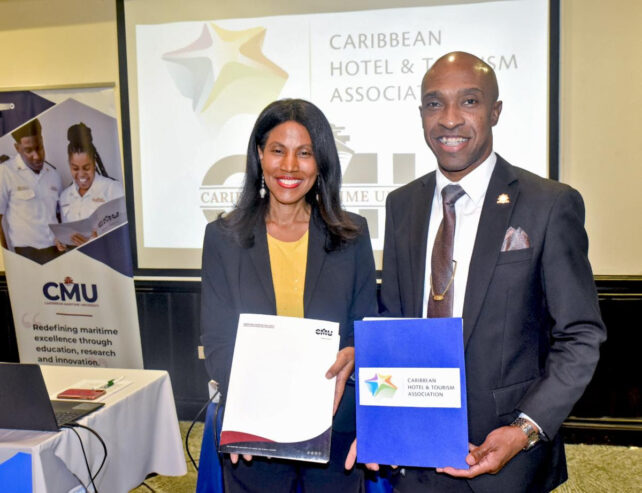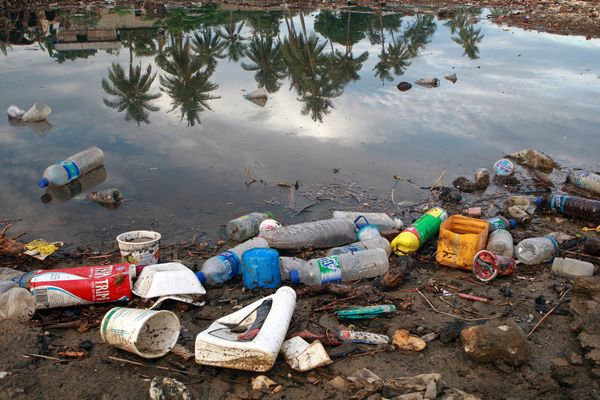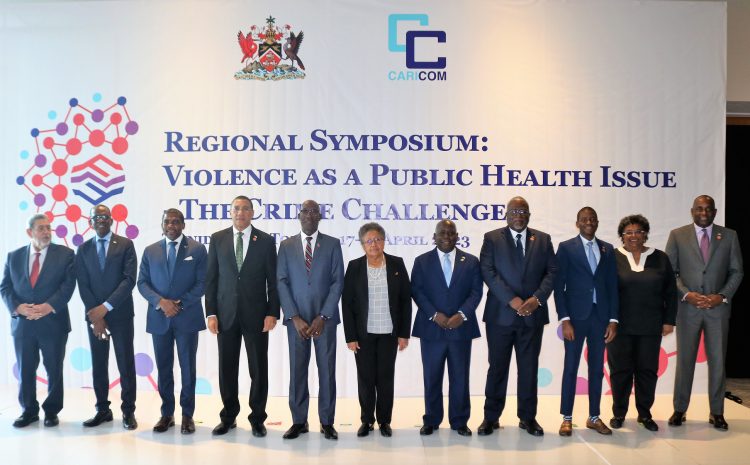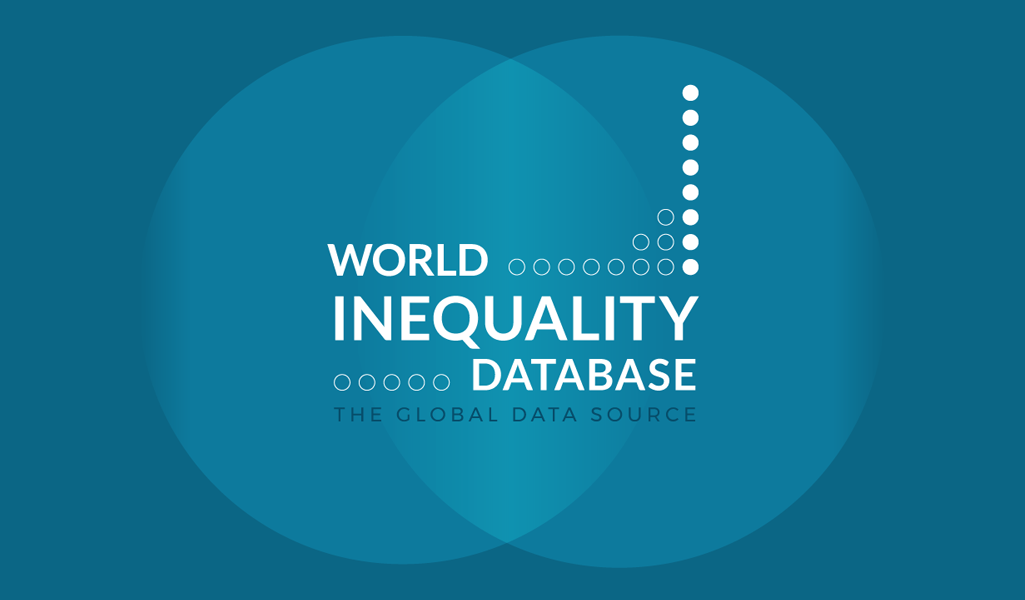L’Association de l’hôtellerie et du tourisme des Caraïbes (CHTA) s’associe à l’Université maritime des Caraïbes pour améliorer les compétences de la main-d’œuvre

La présidente de la CHTA, Nicola Madden-Greig, OD, et le professeur Andrew Spencer, président de l’Université maritime des Caraïbes, officialisent un nouvel accord de collaboration. L’Association de l’hôtellerie et du tourisme des Caraïbes (CHTA) a officialisé un partenariat important avec l’Université maritime des Caraïbes (CMU) par la signature d’un protocole d’accord. Cet effort de collaboration […]
The post L’Association de l’hôtellerie et du tourisme des Caraïbes (CHTA) s’associe à l’Université maritime des Caraïbes pour améliorer les compétences de la main-d’œuvre appeared first on ANTILLA MARTINIQUE | Avec vous depuis 1981.
Les États-Unis et la CARICOM font progresser les efforts de prévention de la criminalité et de la violence chez les jeunes dans les Caraïbes

Du 10 au 12 janvier 2024, le gouvernement des États-Unis, par l’intermédiaire de l’Agence des États-Unis pour le développement international (USAID), et en collaboration avec le gouvernement de la Grenade et le Secrétariat de la CARICOM, accueillera une réunion du Groupe de travail technique (GTT) à Saint-Georges, Grenade, afin de partager les meilleures pratiques […]
The post Les États-Unis et la CARICOM font progresser les efforts de prévention de la criminalité et de la violence chez les jeunes dans les Caraïbes appeared first on ANTILLA MARTINIQUE | Avec vous depuis 1981.
À la Dominique et à la Grenade, près de 25% des déchets sont d’origine plastique… le double des pays industrialisés

Dans les pays développés, les plastiques représentent 11% des déchets. Dans les pays membres de l’OECS (Organisation des Etats de la Caraïbe de l’Est) où le recyclage est peu développé, ce chiffre est presque doublé. À la Dominique et à la Grenade, un projet financé par l’Union Européenne et l’AFD (l’Agence Francaise de Développement), espère améliorer la collecte de ces restes de plastique.
Le gouvernement d’Antigua et Barbuda veut faire la LIAT renaître de ses cendres

Le 04 janvier 2024, les 90 salariés de la LIAT ont reçu un courrier leur annonçant la cessation totale des activités de la compagnie aérienne dans la Caraïbe. Mais le gouvernement d’Antigua et Barbuda pourrait venir à la rescousse de la société.
CarNet’Adapt : un réseau caribéen d’adaptation au changement climatique

Haïti : l’insécurité à Port-au-Prince digne d’un « conflit armé » selon l’ONU

L’insécurité dans la capitale haïtienne atteint des niveaux « comparables à ceux des pays en situation de guerre », s’est alarmé l’ONU dans un rapport publié aujourd’hui (lundi 24 avril), qui souligne une hausse importante des homicides et des enlèvements dans le pays.
La coopération entre la Russie et la Caraïbes, se discute au Venezuela

Ralph Gonsalves, premier ministre de Saint-Vincent et les Grenadines et Sergey Lavrov, ministre russe des affaires étrangères, discutent de coopération. Les deux hommes se sont rencontrés au Venezuela, avant que la Russie ne prenne la présidence du conseil de sécurité aux Nations Unies (ce lundi 24 avril 2023). Sergey Lavrov s’est aussi arrêté au Brésil, au Nicaragua et à Cuba.
Declaration by Heads of Government – War on Guns – Trinidad and Tobago – 18 April 2023

DECLARATION BY HEADS OF GOVERNMENT
WAR ON GUNS
TRINIDAD AND TOBAGO
18 APRIL 2023
We, the Heads of Government of the Caribbean Community (CARICOM) meeting in Port of Spain, Trinidad and Tobago on April 17-18, 2023, on the occasion of the Regional Symposium to address Crime and Violence as a public health issue, register our grave concern at the increase in the illegal exportation of guns from the United States of America which is a direct threat to our democracy.
We declare a War on Guns to combat the illegal trade which provides the weapons that contribute significantly to crime and violence in our Region causing death, disabilities and compromising the safety of our citizens.
We call on the United States of America to join the Caribbean in our War on Guns and urgently adopt and take action to stop the illegal exportation of firearms and ammunition into the Caribbean.
We lament the disproportionate share of our national budgets that we are compelled to allocate to measures to address crime, violence and national security as well as mental health and other health-related challenges, that directly result from the illegal exportation of guns to our region.
We underscore our commitment to utilize all human, financial and other resources to rid our Region of the scourge of illicit weapons.
We reiterate that the Caribbean must be a Zone of Peace, which will allow us to achieve our goal of a secure, stable and prosperous Community for all our citizens.
Issued by the Heads of Government of the Caribbean Community (CARICOM) in Port of Spain, Trinidad and Tobago on Tuesday, 18 April at the Regional Symposium on Crime and Violence
Caricom. Le symposium régional sur la criminalité et la violence publique – CCN – Caraib Creole News l Actualité en Guadeloupe, Martinique et Guyane

Navigation de l’article CARIBBEAN, Cuba, Focus / Par CCNews / novembre 6, 2019 CARIBBEAN, Cuba, Focus / Par CCNews / novembre 27, 2019 CARIBBEAN, Caricréole, Sainte Lucie / Par CCNews / décembre 15, 2019 CARIBBEAN, Caricréole, Sainte Lucie / Par CCNews / décembre 15, 2019 Barbade, CARIBBEAN / Par CCNews / décembre 15, 2019 CARIBBEAN, Caricréole, Sainte Lucie / Par CCNews / décembre 16, 2019
Dominican Republic – WID – World Inequality Database

What is WID.world?
For more information on WID.world and its history, click here.
For more information on the network of researchers, click here.
For more information on methodology, click here. How to read WID.world graphs?
Click here for help on how to navigate through WID.world menus and graphs. I encounter technical problems on WID.world, what should I do?
First, accept our apologies. Second, you should delete the cache memory of your browser (generally under “settings/history/clear cache”), then close it, and try again. If this does not solve the problem, you may want to try with a different browser. And, finally, send us an email with the description of the issue, and the details of your operative system and browsers versions. Our contact mail is in the website footer, under the CONTACT US section. What distinguishes WID.world’s inequality data from the OECD, the World Bank, or other inequality data providers?
Only few institutions provide inequality estimates and those who do so (e.g. the the OECD or the World Bank data portals) rely for the most part on household surveys. One key problem with surveys, however, is that they are based upon self-reporting and are well known to underestimate top incomes and top wealth shares. In addition, surveys only cover a limited time span and make it impossible to offer a long-term perspective on inequality trends.
In contrast, WID.world combines national accounts and survey data with fiscal data sources. This allows us to release inequality estimates that are more reliable – from the bottom to the top of the distribution of income and wealth – and also that span over much longer periods.
The data series provided in WID.world should however not be seen as perfect and definitive: existing series are continuously updated and improved by WID.world fellows, following new raw data releases or conceptual and methodological improvements. All the methodological followed to construct our series can be found in country-specific papers in our methodology library or in the DINA guidelines.
Should you have further questions on the data, do not hesitate to contact us. What distinguishes WID.world’s national accounts data from the UN, the IMF, the World Bank, or other national accounts data providers?
Estimates for national accounts (such as national income and national wealth) found on WID.world and on international statistical institutions databases are generally consistent, buy can vary for several reasons.
First, we release detailed series for national wealth accounts, which usually cannot be found on other portals. Next, we include corrections for offshore wealth and offshore capital income, so that our series on foreign capital income inflows and outflows are consistent at the global level (e.g. they sum to zero), which is typically not the case in existing databases.
Finally, reliable series for the consumption of fixed capital (capital depreciation) estimates are not readily available for a large number of countries, so we combine various sources and develop new methods to derive consistent global series.
As a consequence, we are able to offer consistent global series on national income – i.e. GDP minus consumption of fixed capital, plus net foreign income – which do not exist elsewhere.
WID.world uses 2011 Purchasing Power Parity round for international comparisons. It should also be noted that default monetary values for Eurozone countries are displayed in PPP Euros and are thus different from Market exchange rate Euros. A Eurozone country with high relative prices will have a lower PPP Euro average income values. Market exchange rates values can be obtained in our custom menus.
All these methodological choices can explain slightly different values between WID.world and other data portals. They are described in the Metadata associated to each variable and in the associated methodological documents. See in particular the « World National Accounts Series Methodology » (here) and the « Distributional National Accounts Guidelines » (there).
In addition, it should be noted that there are specific countries such as China where there is substantial controversy about price deflators and aggregate real growth. In such cases we review all existing series and attempt to combine them in the most sensible manner. This is fully explained in the country-specific papers.
Should you have further questions on the data, do not hesitate to contact us. There are already many on line economic data portals, why using WID.world?
Over the past decades, the increase in economic inequalities was largely driven by a rise in income and wealth accruing to the top of the distribution. However, household surveys, the data sources traditionally used to observe these dynamics, do not capture these evolution very well. They provide useful information and cover a lot of countries but do not inform adequately on income and wealth levels of the richest individuals.
WID.world overcomes this limitation by combining different data sources: national accounts, survey data, fiscal data, and wealth rankings. By doing so, it becomes possible to track very precisely the evolution of all income or wealth levels, from the bottom to the top. The key novelty of the WID.world project is to use such data in a systematic manner, allowing comparisons between countries and over long time periods.
For more information on what you will find (and will not find) on WID.world, click here. What is the meaning of the economic concepts used on WID.world?
We try our best to use economic concepts which are consistent with national accounting (i.e. the system used for measuring the economic activity of a nation) and that can also make sense for the general public. On each graph, users can click on the “?” icon and will find the definition of the concepts at stake.
Users can also use our quick-search glossary to find the definition they want. How is WID.world funded?
WID.world is entirely funded by public, non-profit actors and personal donations.
For more information on our funders, click here.
If you wish to support us, please click on the DONATE button at the bottom of the funding page.